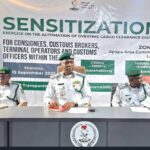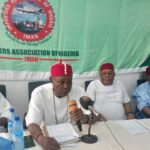The National Automotive Design and Development Council (NADDC), says the success of the automotive industry is hinged on Nigeria’s ability to harness its resources and talent- NAN
The Director-General of NADDC, Mr Joseph Osanipin, said this on Thursday, at the second edition of the Nigeria Auto Industry Summit in Lagos.
The summit organised by the Nigeria Auto Journalists Association (NAJA), in partnership with NADDC, had the theme, ‘Nigeria First: Local Content as Catalyst for Automotive Economy’.
Osanipin represented by Mrs Felicia Oyegbolu, Deputy Director and Head of Press and Protocol at NADDC, disclosed that local content development is the engine that will drive the needed transformation in the industry.
He urged stakeholders to renew their commitment to the “Nigeria First” agenda.
Osanipin tasked manufacturers, suppliers, financial institutions, government agencies, and the academia to work hand-in-hand to identify opportunities and overcome obstacles for the growth of the automotive sector.
He said there was need to invest in local capabilities, innovative and supportive policies for the growth of the sector.
“The automotive industry has the potential to be a major driver of Nigeria’s industrialisation and economic prosperity.
“By prioritising local con

tent, we are not just building cars; we are building an economy, creating jobs, and securing a brighter future for generations to come,” he said.
He also said that local content development would lead to economic diversification, value retention, technology transfer and skill development, as well as supply chain resilience.
He, however, said that it would require concerted efforts to achieve these.
He said there was the need to collectively address challenges in the sector such as lack of access to finance for local manufacturers and inconsistent power supply.
Also, the Director-General of the Standards Organisation of Nigeria (SON), Dr Ifeanyi Okeke, said the way forward for the automotive sector would be to enforce the “Nigeria First” policy in public procurement.
Okeke was represented by Mr Damola Abayomi, the Head of Mechanical Lab at SON.
He said there was need to incentivise original equipment manufacturers and global suppliers to invest in local parts production.
He called for strengthening of collaboration among the Federal Government, automotive industry and the academia.
Okeke also urged development of a roadmap for 100 per cent local car assembly by 2035.
“Local content is not just a policy. It is a catalyst for transformation, and SON is committed to quality, innovation and sustainability in the sector,” he said.
Victoria Backhaus-Jerling, Chief Executive Officer, African Association of Automotive Manufacturers, urged Nigeria to provide a policy that would lay a stronger foundation for sustainable local manufacturing, job creation and enhanced investor confidence in the sector.
 Backhaus-Jerling said that the sector would be vulnerable to unchecked used imports without such a policy.
Backhaus-Jerling said that the sector would be vulnerable to unchecked used imports without such a policy.
“Nigeria risks missing out on the opportunities industrialisation can bring.
“We have seen what is possible in countries such as Morocco, Egypt, Ghana and South Africa, and we believe Nigeria can do even further.
“Political will and decisive actions will be the game changers,” she said.
Backhaus-Jerling said that Nigeria had the talents and entrepreneurial spirit to achieve the goals
















